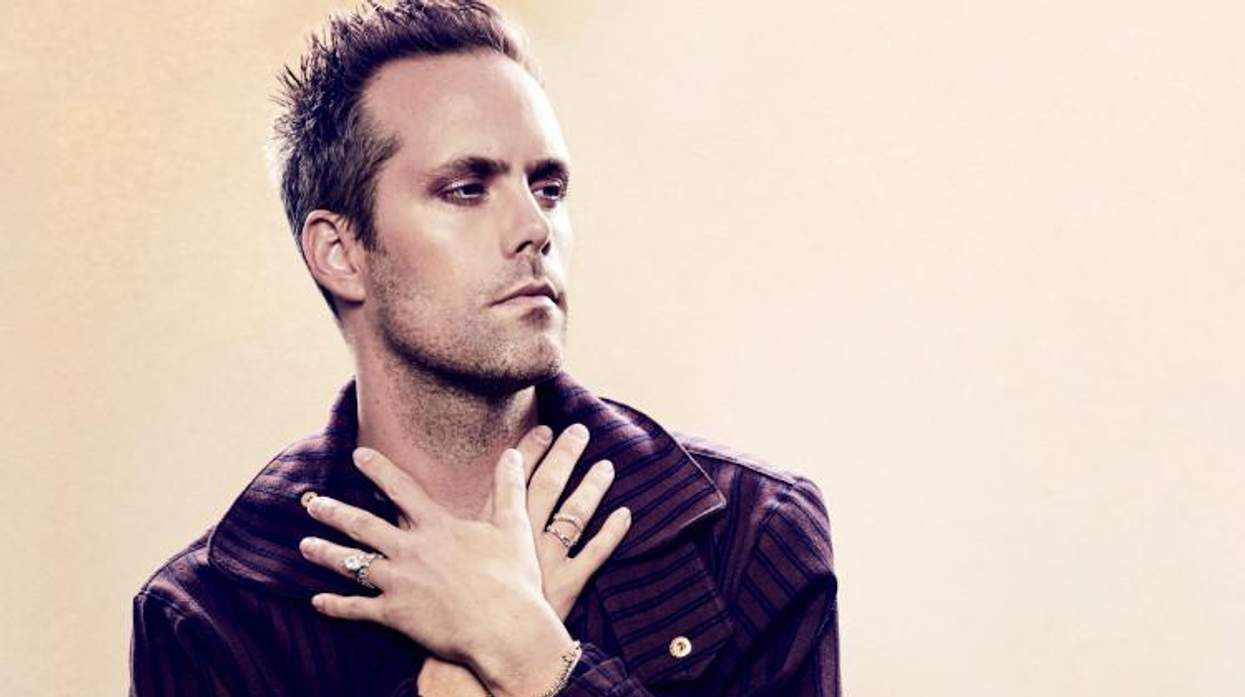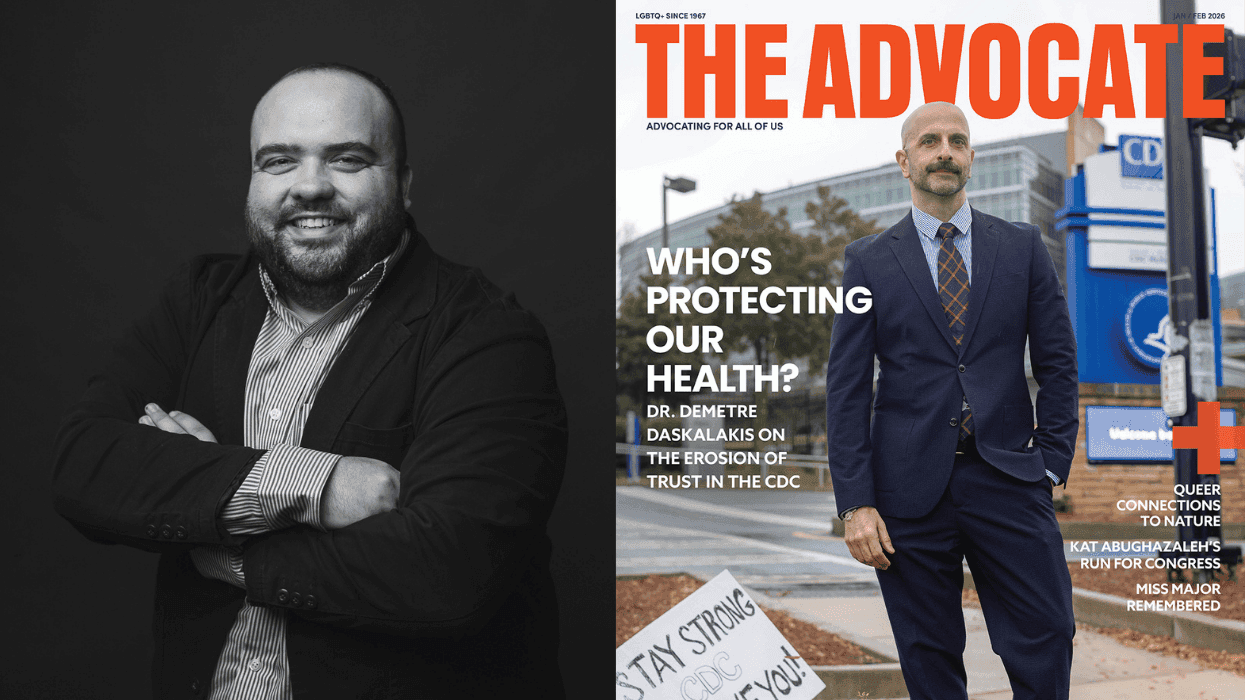This interview was conducted as part of the interview series LGBTQ&A, a weekly podcast that documents modern queer and trans history.
Originally making a name for themself as the lead singer of the glam rock band, Semi Precious Weapons, Justin Tranter has transitioned a behind-the-scenes role, effortlessly becoming one of the most successful songwriters working today. Tranter's written for the biggest names in pop music including Selena Gomez, Britney Spears, Janelle Monae, Justin Bieber, Halsey, Ariana Grande, Gwen Stefani, and Kelly Clarkson.
Justin Tranter spoke with the LGBTQ&A pod this week about why their "femme queerness" is so overwhelming to people, how the opportunity to write pop music happened by accident, and why we need to stop calling straight women "gay icons."
"We need to be our own icons."
Read a preview below and click here to listen to the full podcast interview.
Jeffrey Masters: You were originally part of the band Semi Precious Weapons. You put out records, had major record deals, you toured with Lady Gaga. From the outside, it looks like a massive success. Why do you describe it as a failure?
Justin Tranter: The answer is in what you just said. You said major record deals. Plural, honey. We had four record deals, and we were dropped from them all. Only two of those labels put out albums. No one made their money back. We were insanely broke.
The Gaga tour was an unbelievable experience that we lost hundreds of thousands of dollars on. It put our band in debt for years and years. When I say it was a failure, I mean financially. Not just for us, personally. Many companies lost millions of dollars on trying to make something happen with my band.
I think emotionally, it was a huge success, and I think culturally it was a huge success. I think our band affected a lot of people, especially queer people, especially femme, however they identify, femme men, gender nonconforming trans people. I was one of their only examples in that era.
JM: How much did your sexuality play into how the music industry treated you?
JT: You know, a lot. It was just a very, very interesting thing where people would come and see our show, and they would see these fans. They'd be like, "Oh my God, this is amazing. This is crazy. This passion is there." I have always had at least a lyric in every song that people could never forget, which has now translated into my current career very well.
Executives would come and see that, and they'd be like, "OK, this is amazing." Then, they would sign us, and then they would ask us to change, immediately.
It was very passive homophobia and femmephobia, for the most part. It was always sold to me in this thing of, "Well, we believe in you, and we think you're a superstar, and we think your songs are amazing, so we're just trying to help you. If you could change who you are, it will really help you."
I think that has worked for people in the past, it was just never going to work for me. I'm a very transparent human being and I'm very loud. Me pretending to be somebody I'm not is just going to look like bullshit and people can smell bullshit a mile away.
JM: How did queer media cover you?
JT: For the most part, really good. But also, sometimes not. Because I was so hyper-sexualized, because I'm a sexual person, and my music was...I just would love to shock people. Queer people being sexual publicly, in a way that they're in control of is still not that common, especially femme queer people being hyper-sexual in a way they're in control of and not sexualized in a way they're weren't asking for. I was asking for it.
JM: We sexualize the masculine ones.
JT: Yes, for sure. I was a femme person, sexualizing myself, and a lot of queer media was very upset about that. We were still hiding femme people. Femme still wasn't considered chic or exciting.
Another really interesting point is that my band members who were all straight were experiencing homophobia. People were so overwhelmed by femme queerness existing in public, that everyone just assumed the whole band was queer.
JM: Was there disbelief that these straight guys would want to be a part of a band with a queer front person?
JT: There weren't examples of queer people and straight people being friends, at this point. Queer men and straight men, I should say. There've been examples of queer men and straight women being friends, forever. There weren't even examples of them, of people being friends on television. Will and Grace had no straight male friends on the show.
JM: I ask about queer media because queer people have historically been very hard on queer people in the public eye.
JT: Well, I say all the time, we all have to stop calling straight cis women gay icons. We need to be our own icons. We can call a trans woman a gay icon, we can call a lesbian a gay icon, I don't care. They need to be in our fucking community.
It's internalized homophobia. We are not comfortable seeing a queer person act out queerness on stage, but we are very comfortable seeing a cis, normally white woman, act out queerness in public because it doesn't make us look at ourselves. It doesn't make us ashamed of ourselves.
JM: How long have you been using they/them pronouns?
JT: I've only been using they/them pronouns the last couple years.
This is personal--this is not all gender non-conforming people--I don't really care about my pronouns because I feel like if they/them pronouns were around when I was younger, I would have been hard, fast, oh my God, this is who I am. Because it is who I am, my femininity is very important to me but I don't see myself as fully trans.
My femininity is so important to me. Gender non-conforming is very, very, very much who I am, and always have been, but the pronoun situation, for me, isn't that serious.
JM: So, you use all pronouns?
JT: I use all pronouns. They/them/theirs is what I relate to the most. If I have a choice, that's it, but I really don't give a fuck.
JM: There are still articles that call you "the man" behind your favorite songs. Does that bother you?
JT: You know what's so funny with me and pronouns? When I've been called, "The Behind the Scenes King of Pop," that creeps me out. I am definitely Queen, I'm not a King. I have two dogs I love very much, when people call me their father, or their dad, that creeps me the fuck out. Bro, man, that shit is weird. He/him/his does not freak me out. Man, King, bro, dude, dad do.
JM: You've made your name as a pop music songwriter, but that is very much not the type of music you made with your band.
JT: And it's not the music I listen to. The music I listen to didn't sound like my band, either.
I don't know what the fuck I'm doing with my life, but I think it's working.
JM: Can you explain the dichotomy between all of those?
JT: I could try for you. The music I listen to is very much alternative, folk, female singer-songwriter vibe. Semi Precious Weapons kind of just happened. That sound came out of trying to recreate the New York that I thought I was going to move into. When I got to New York, it was already the big financial change, where everyone was moving there, finance was happening. You were either moving there for finance or to be Carrie Bradshaw. I thought we were all moving there to be Andy Warhol, and The Ramones, and Debbie Harry. I got there, and I was very wrong.
The band was born out of trying to recreate that energy, and matching my personality. My personality was very close to the lyrics in that world. The sound was just created out of, "Fuck New York City. We need to fuck this place up."
Then, pop music just happened because a door was opened for me, and I ran through it super hard. The opportunity was an accident, I wasn't going for that opportunity, but definitely, once the door was opened, I worked so hard I almost died 17 different times.
JM: You went from being the lead singer of this band to creating art that, when the public sees it, has somebody else's name on it. Was that a big decision?
JT: No, it was just...for the first year, I was still doing both. The band had just been dropped from Epic Records, and we were figuring out how to put the album out, because we loved the album. The guy that signed us to publishing had left the publishing company. We thought, oh, that's another kiss of death.
Luckily, the woman who was brought in to replace him, was named Katie Vinton, who is now my business partner. I played her the new album, which was the last SPW album called Aviation. She was like, "I love this, and it's leaning way more pop." She said, "So, while you're figuring out how you're going to put that album out, I could put you in sessions with and for other artists, if you want." It started as, "Oh, let me just go do this, while we're in limbo anyway."
JM: You said you were broke. Was money part of the decision?
JT: Oh, completely. We were so broke. In 2013, I made $12,000, for the entire year, which was way below the poverty level. It was in that year, I was writing songs for others, started doing that process. Then, I started to really love it, and it started to feel so freeing because it was not about me. There was something so creatively exciting to be like, "This has nothing to do with me. Let me just help this person fucking be the best version of themselves they possibly can."
It was a year of writing, while still doing random band stuff, and trying to make that happen. Then, one day I was just like, Fuck it. At that point, I was 33.
I didn't have a hit yet, but some big people had recorded my songs. My band members supported me, and they understood why. I was able to hook them all up with great jobs, now, so everything's good.
JM: Is that when you started identifying, first and foremost, as a songwriter?
JT: Yeah. I was like, "This is working and I think this is what I'm meant to do, at least for now." At that point, at 33, I really knew who the fuck I was. I have kind of always known who I was. Even when I grew and changed as a human being, I was very aware of the growing and changing that was happening.
When you're a queer person who is super confident and super free and super excited to just do something, I saw the value that I was bringing, very early. I was like, "Let me just fucking do this...I'm tired. These people really value and appreciate what I'm bringing to this room, so I'm just going to fucking go here, and enjoy it."
Thank God I made that decision.
[Click here to listen to the full podcast with Justin Tranter.]
New episodes of the LGBTQ&A podcast come out every Tuesday on the Luminary app.
Photography by Christopher Patey.















Charlie Kirk DID say stoning gay people was the 'perfect law' — and these other heinous quotes
These are some of his worst comments about LGBTQ+ people made by Charlie Kirk.